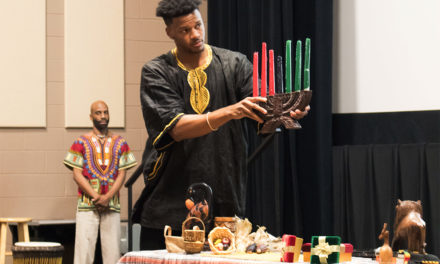Tunnel of Oppression enlightens students on issues of power, privilege & prejudice
Jillian Smith | Staff Writer
The Tunnel of Oppression took participants on an hour-long journey through a handful of thought-provoking scenes aimed at urging students to think critically about issues that impact the NC State community such as race, class, body image and gender identification.
The Office for Institutional Equity and Diversity (OIED) and Multicultural Student Affairs (MSA) sponsored the Tunnel experience for two days in Talley Ballroom on Feb. 4 and 5. The Tunnel featured five different live scenes that told stories of power, privilege and prejudice.
Following the tour, participants shared their thoughts and experiences during a group discussion. The most commonly used words were “powerful” and “intense.”
“What you think is going to happen is not going to happen,” said and O’Licia Parker-Smith, a freshman in Communication. “If you want to actively increase your knowledge and bring awareness to others, you should go.”
The Tunnel of Oppression was originally initiated in 1993 at Western Illinois University and has since spread to schools all over the nation.
Groups were guided through scenes of sexism, transphobia, classism, sizeism and racism performed by student volunteers.
Wanting attendees to explore how one person can be oppressed in more than one way, organizers worked to add the topic of “intersectionality” to the tunnel experience, according to assistant director of MSA Jasmine Omorogbe.
Intersectionality was best displayed in a scene which showed how classism and sizeism can intersect.
The scene discussed how size can be directly related to the amount of money that someone has. When funds are limited, it is much more cost-efficient to purchase heavily processed foods. Eating these kinds of foods can cause serious health and weight issues, putting a person in a position to receive criticism and oppression in two ways.
During the experience, attendees were asked to complete a simple demographic survey, much like any you would fill out for a job or a tax form. However, some identities were conspicuously absent, such as “Black” and “White,” in the race section. “Christian” was left out of the religion section. “Married” was left out of the family status section and the disability status section listed a limited range of conditions a person might suffer from.
All of this is done to make you feel a bit uncomfortable, similarly to any person that doesn’t fit into one of society’s pre-established demographic boxes. It also makes you question the reasoning behind why we have these “boxes” in the first place.
During a courtroom scene a young girl, the plaintiff in a rape case, is questioned by the defendant’s attorney. “How short was your skirt that night? How many drinks did you have?” the attorney asks. The powerful scene illustrated sexism by showing how pervasive it can be, especially when it comes to cases of sexual assault or harassment, something regularly occurring on college campuses now.
As the LGBT community is growing, the likelihood of meeting or interacting with a transgender individual is increasing. Students reenacted the difficulties a transgender individual may face in explaining their situation to friends and family.
“I wanted to give some feelings of safety by being a good listener and using my counseling skills. I also wanted to be a real life example of a transgender person,” said A.J. Hebard, a volunteer facilitator. A.J. gave the group insight on their transgender experience at the end of the Tunnel in the discussion room.
The goal of the event was to “make people think and reflect,” Omorogbe said.
One scene also addressed the issue of racism and the outrage felt in the country and on campus following several highly publicized incidents of Black fatality in 2014.
A black protester held a sign that read “Black Lives Matter,” was confronted by a white peer. The black protester explained that even though black people have equality in civil rights, prejudice and stereotyping is still blocking real social equality for minorities.



